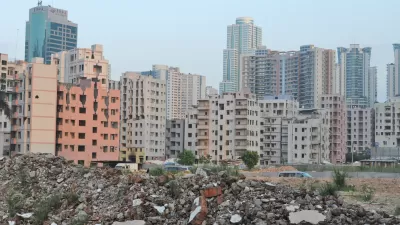Minneapolis is, by many accounts, home to a thriving economy. Why then, are there so many vacant properties in the city?
"Nearly 340 residential buildings sit empty and boarded across Minneapolis, despite a severe housing shortage and a steep vacant property fee that has raised $20 million for city services over the past decade," reports Andy Mannix.
The number of vacant properties has declined by half since the height of the Great Recession and Foreclosure Crisis, according to Mannix, but the remaining vacancies are proving particularly obstinate.
According to Mannix, the persistence of these vacant properties works contrary to every manner of market pressure. The city charges the owners of vacant properties $7,000 a year in fees, the housing market is tighter than it's been in decades, and the foreclosure rate in Minneapolis is one of the lowest in the country.
The article explores, in a lot more detail, why vacant property owners keep paying the fee, what services the fee pays for, and why the city is motivated to improve vacant properties.
FULL STORY: Minneapolis still battling against vacant properties -- even in housing shortage

Planetizen Federal Action Tracker
A weekly monitor of how Trump’s orders and actions are impacting planners and planning in America.

Congressman Proposes Bill to Rename DC Metro “Trump Train”
The Make Autorail Great Again Act would withhold federal funding to the system until the Washington Metropolitan Area Transit Authority (WMATA), rebrands as the Washington Metropolitan Authority for Greater Access (WMAGA).

DARTSpace Platform Streamlines Dallas TOD Application Process
The Dallas transit agency hopes a shorter permitting timeline will boost transit-oriented development around rail stations.

Renters Now Outnumber Homeowners in Over 200 US Suburbs
High housing costs in city centers and the new-found flexibility offered by remote work are pushing more renters to suburban areas.

The Tiny, Adorable $7,000 Car Turning Japan Onto EVs
The single seat Mibot charges from a regular plug as quickly as an iPad, and is about half the price of an average EV.

Supreme Court Ruling in Pipeline Case Guts Federal Environmental Law
The decision limits the scope of a federal law that mandates extensive environmental impact reviews of energy, infrastructure, and transportation projects.
Urban Design for Planners 1: Software Tools
This six-course series explores essential urban design concepts using open source software and equips planners with the tools they need to participate fully in the urban design process.
Planning for Universal Design
Learn the tools for implementing Universal Design in planning regulations.
Municipality of Princeton
Roanoke Valley-Alleghany Regional Commission
City of Mt Shasta
City of Camden Redevelopment Agency
City of Astoria
Transportation Research & Education Center (TREC) at Portland State University
US High Speed Rail Association
City of Camden Redevelopment Agency
Municipality of Princeton (NJ)




























